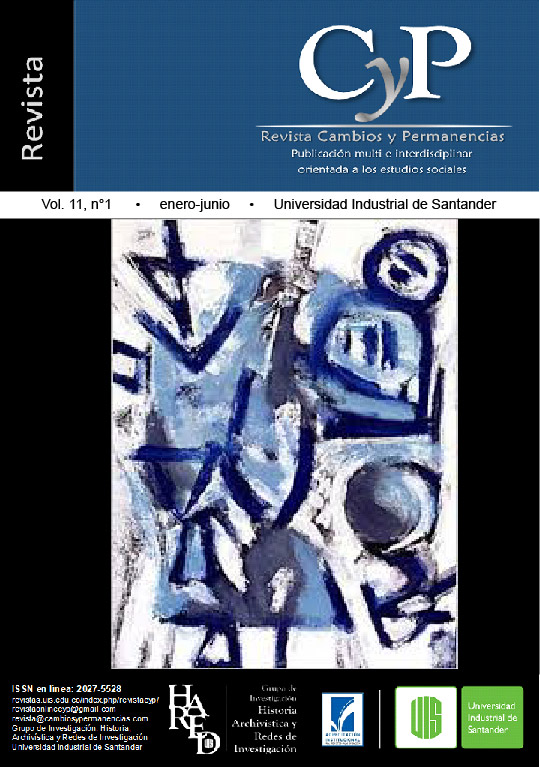Building the concept of resilience in the discourse of the Knowledge Sharing Farms Project (FINCO)
Published 2020-06-30
Keywords
- Resilience,
- FINCO,
- business discourse,
- rhetoric
How to Cite
Abstract
This paper examines the construction of the concept of resilience in the institutional discourse of the Knowledge Sharing Farms project (hereinafter FINCO), who make direct and indirect reference to this notion from the construction of three videos that will be part of the corpus of analysis. The videos present three life stories of peasant families living in the rural area of San Vicente de Chucurí in Colombia. Each video corresponds to the name of the family estate and lasts between 6 and 7 minutes. This analysis is important because the FINCO team proposes resilience as a strategy to address the problems of Colombian farmers such as the armed conflict, climate change, market volatility and disruptive interventions by the state and ONGs (FINCO, 2019). It is concluded that FINCO's discourse presents a rhetoric of resilience built through the business matrix inserted in historically vulnerable populations. Likewise, there is evidence of the construction of totally alien testimonies of the essential conflict of the rural populations, in such a way that what happens in the countryside is made invisible.
Downloads
References
Becoña, E. (2006). Resiliencia: definición, características y utilidad del concepto. Revista de Psicopatología y Psicología Clínica, 11(3), 125-146.
Bell, A. (2002). Los cinco principios de la resiliencia organizacional. (S. L.) Gartner Inc.
Cadavid, M. (2014). Mujer: blanco del conflicto armado en Colombia. Analecta, 4(7), 301-318.
Charaudeau, P. (2013). El investigador y el compromiso. Una cuestión de contrato comunicacional. Revista Latinoamericana de Estudios del Discurso, 14(1), 7-22.
De La Fabián, A. R., y Sepúlveda Galeas, M. (2018). Gubernamentalidad neoliberal postsecuritaria y resiliencia: una nueva metafísica de la identidad. Athenea Digital, 18(3). Recuperado de https://doi.org/10.5565/rev/athenea.2114
Fairclough, N. (2003). El Análisis del Discurso como método para la investigación en ciencias sociales. En: R. Wodak., y M. Meyer. (coords.), Métodos de Análisis Crítico del Discurso, (pp. 179-200). Barcelona, España: Gedisa.
Foucault, M. (1977). Nacimiento de la biopolítica. Buenos Aires, Argentina: Fondo de Cultura Económica.
Gonzáles, W. (2016). La resiliencia como genealogía y facultad de juzgar. Praxis filosófica, Nueva serie, (45), 203-229.
Howell, A. (2015). La resistencia como mejora: La gobernabilidad y la economía política más allá de la "responsabilización". Politics, 35(1), 67-71. Recuperado de https://doi.org/10.1111/1467-9256.12080
Matijasevic, M., y Ruiz, A. (2012). Teorías del reconocimiento en la comprensión de la problemática de los campesinos y las campesinas en Colombia. Revista colombiana de sociología, 35(2), 111-137.
Minolli, B. (2000). Empresas resilientes, algunas ideas para construirlas. (S. L.): UCEMA. Disponible en: http://www.ucema.edu.ar/u/cpcbm/Investigacion/Resiliencia/Empresas_Resilientes.pdf
Pêcheux, M. (2016 [1975]). Discurso e ideología(s). En Las verdades evidentes. Lingüística, semántica, filosofía (pp.129-140). Buenos Aires, Argentina: Centro Cultural de la Cooperación.
Piñeiro, J., y Romero, N. (2011). Responsabilidad empresarial y resiliencia. Galega de economía, 20(2), 1-34.
RAE (Real Academia Española). (2018). Diccionario virtual RAE. Recuperado de http://www.rae.es
Serrano, O. E. (1999). Planos discursivos del texto verbal. (S. L.). Recuperado de www.geocities.com/semiótico/
Socha, D., Lozano, K., Lozano, M., Guzmán, K., Torres, B., Díaz, D., Duran, Y., Salamanca, P., y Mera, S. (2016). Voces rurales y urbanas del Conflicto Armado, la Violencia y Paz en Colombia. Informes psicológicos, 16(1), 65-84.

